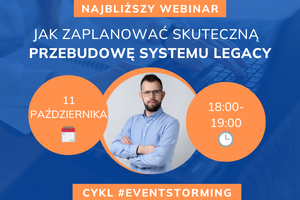Workshop description
The Engineering Manager is a new technical role that is becoming increasingly popular in product companies. Leaders take responsibility for leading teams, optimizing delivery, and achieving organizational goals. They are a key element in stable value delivery for business and customers.
The “Engineering Manager” training will help you become such a leader. You will gain knowledge that you can use successfully when leading your teams. The range of techniques and practices will allow you to solve everyday problems in teamwork and organization.


Knowledge to obtain
What you will learn
Check out the skills you will develop:
- Learn how to translate the company mission into team goals
- Build a roadmap and plan for your product
- Develop team structures tailored to the problem
- Learn measures and practices for delivery optimization
- Conduct 1-1 sessions with your colleagues
Training Program
The program described below is a proposal - for each workshop, we create a customized program based on your needs.
- Responsibilities of an Engineering Manager
- Characteristics of an Engineering Manager
- Company mission and vision
- Organizational goals
- Organizational engineering strategy
- Product business goals
- Engineering team product strategy
- Stakeholders
- Roadmap and plan
- Division of work
- Dependencies
- Priorities
- Organization structure vs system structure - Conway's Law
- Dependencies between teams - Team Topologies
- Work culture
- Team contract
- Change management
- Agile work
- Planned work
- What to choose when
- Scaling methods
- Lean metrics and practices
- Theory of constraints - bottlenecks
- DORA metrics
- Other work optimization practices
- 1-1 sessions and feedback for employees
- Performance review and long-term goals
- Career path planning for employees
- Building the target candidate profile
- Recruitment process
- Candidate evaluation
- Onboarding process
- Teamwork models
- Delegation levels
- Decision making
- Task and process organization
- Information organization
- Time management
- Budgeting basics
- Team-training budget
- Budget spreadsheet


